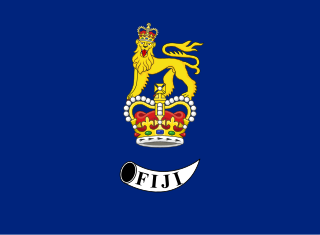 W
WThe Colony of Fiji was a British Crown colony that existed from 1874 to 1970 in the territory of the present-day nation of Fiji. London declined its first opportunity to annex the Kingdom of Fiji in 1852. Ratu Seru Epenisa Cakobau had offered to cede the islands, subject to being allowed to retain his Tui Viti title. His demand was unacceptable to both the British and to many of his fellow chiefs, who regarded him only as first among equals, if that. Mounting debts and threats from the United States Navy had led Cakobau to establish a constitutional monarchy with a government dominated by European settlers in 1871, following an agreement with the Australian Polynesia Company to pay his debts. The collapse of the new regime drove him to make another offer of cession in 1872, which the British accepted. On 10 October 1874, Britain began its rule of Fiji, which lasted until 10 October 1970.
 W
WGeneral elections were held in Fiji between 17 April and 4 May 1963. For the first time, women and indigenous Fijians were given the right to vote alongside the male European and Indo-Fijian population.
 W
WGeneral elections were held in Fiji between 26 September and 8 October 1966, the last before independence in 1970 and the first held under universal suffrage. The result was a victory for the Alliance Party, which won 23 of the 34 elected seats. Its leader Kamisese Mara became the country's first Chief Minister the following year.
 W
WBy-elections for the nine Indo-Fijian seats in the Legislative Council were held in Fiji between 31 August and 7 September 1968. The seats had previously been held by the Federation Party, but their members had resigned in protest at the introduction of ministerial government and failure to reform the electoral system.
 W
WThe colonial Governors of Fiji relied on the Executive Council for advice on proposals for legislation which, after being discussed in the Executive Council meetings, came before the Legislative Council in the form of bills. In this way, the Executive Council was the chief policy-making body and performed cabinet-like functions, but being advisory, was not yet a cabinet in function. This role changed in 1964 with the introduction of the membership system.
 W
WThe pound was the currency of Fiji between 1873 and 1969. It was subdivided into 20 shillings, each of 12 pence.
 W
WFiji became a British Crown Colony in 1874, and an independent Dominion in the Commonwealth in 1970. Queen Elizabeth II remained the Head of State, holding the title of Queen of Fiji until 1987, when she formally abdicated following two military coups. From 1874 to 1987 the Monarch's functions were exercised in Fiji by his or her representative, the Governor, and, following independence, by the Governor-General.
 W
WThe Legislative Council of Fiji was the colonial precursor to the present-day Parliament, which came into existence when Fiji became independent on 10 October 1970.
 W
WCarl Ludwig Sahl was a German businessman and diplomat who lived in the British Colony of New South Wales for 25 years until his death, and served as the German Consul in Sydney as well as the Special Commercial Agent of the Kingdom of Fiji in Sydney.